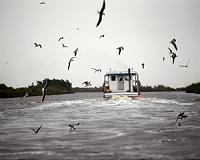 |
On Board The Rainbow Warrior (AFP) May 31, 2010 Off the coast of Malta, bobbing in the Mediterranean waters, a flotilla of fishing boats is waiting to net swarms of bluefin tuna before the catching season ends in mid-June. The tuna aren't the only ones being hunted. Environmental campaigners are waiting too, their binoculars and monitoring devices trained not on the sea but on the trawlers. "Actually, I want them to start fishing," said Oliver Knowles, a campaigner for Greenpeace, which wants a moratorium on bluefin tuna fishing and has sent two ships to the Mediterranean to try to disrupt the hunt. "You want a little environmental destruction, so you get to say something about it," he told his young crew of 26 on board the organisation's flagship Rainbow Warrior. "There's a perversity about being a campaigner -- you have to hope for some bad news. I don't want them to fish. "But actually, unless we raise the political temperature on this, and get them to stop, they can come back year after year after year." At any one time there are a dozen or more vessels in an area large enough for them to remain out of sight of each other. From France, Spain, Turkey and elsewhere. Some barely move, others shift constantly. Many of the boats carry net cages used to encircle the tuna swarms, which are then towed offshore to be fattened and shipped in giant freezer ships to Japan, where it is a mainstay of sushi and sashimi. The larger and fatter, the more valuable they are -- the biggest specimens can fetch more than 100,000 dollars (80,000 euros) at the Tsukiji fish market in Tokyo. Industrial-scale fishing and harvesting on the high seas has caused stocks to plunge by up to 80 percent in the Mediterranean and eastern Atlantic, where they come to spawn in the warmer waters. Earlier this year the European Union and the United States attempted to ban the trade of the species, but Japan lobbied successfully and the proposal was defeated. The focus has now returned to the open waters until the tuna season ends on June 15, and Greenpeace flew reporters, including AFP, by helicopter onto the Rainbow Warrior to follow its side of the chase. Leaning over nautical maps and compasses, Knowles and his crew monitor the trawlers, looking for signs they might have found a swarm. "If they start circling or their speed slows down," he said, "it's usually an indication that they at least think they've got a shoal of fish." That's the point when the Greenpeace activists want to step in to disrupt any fishing to "stop them taking the fish out of the water," said Knowles. Greenpeace refuses to divulge what kind of tactics it might employ. In May, activists on board rafts temporarily blocked three tuna fishing vessels from leaving the port of Sete, in southern France. There is little time left. The wrangling over a ban piled further pressure on the International Commission for the Conservation of Atlantic Tunas (ICCAT) to shorten the fishing season to four weeks this year and shrink the quota of bluefin tuna that can be caught from 19,500 to 13,500 tonnes in 2010. "Most scientists thought the quotas were higher than they should be," said Audun Lem, a fishery trade expert at the Food and Agriculture Organisation. Italy went further and imposed a moratorium on industrial fishing of tuna this year, paying its fishermen and companies 10 million euros (12.3 million dollars) to keep their boats at harbour. The 49-strong tuna fleet, now being reduced to nine, "was subsidised to be built. It is now subsidised to stay at home. And it will be subsidised to be destroyed," said Francois Chartier, a campaigner on board the Arctic Sunrise, the other Greenpeace vessel in the Mediterranean. "It is a total aberration." If everyone respected their quota, "we should have an improvement" in the situation, said Massimo Spagnolo, who heads a research institute close to the fishing industry. Spagnolo, who says quotas are not a good idea because they encourage early and intensive fishing before the tuna can actually spawn, believes ICCAT has overstated the danger facing the species. "If you go to the Tirrenian Sea there is a lot of tuna," he said, referring to waters off Italy's west coast. South of Malta, however, it's apparently not warm enough yet to draw tuna. The Rainbow Warrior has been at sea for more than a week but hasn't been able to disrupt any fishing. "There's a good selection of vessels all around us," Knowles said. "We'll just have to keep watching. We just have to be patient."
Share This Article With Planet Earth
Related Links Farming Today - Suppliers and Technology
 Dozens of fish species in danger in US oil leak: expert
Dozens of fish species in danger in US oil leak: expertGalliano, Louisiana (AFP) May 31, 2010 Dozens of species of fish including one just discovered six months ago, could be wiped out by the massive oil leak in the Gulf of Mexico that has been spewing crude into the sea for six weeks, a scientist said Monday. "We may very well lose dozens of vulnerable fish species," Prosanta Chakrabarty, a fish scientist at Louisiana State University, told AFP by email. "Currently there are no ... read more |
|
| The content herein, unless otherwise known to be public domain, are Copyright 1995-2010 - SpaceDaily. AFP and UPI Wire Stories are copyright Agence France-Presse and United Press International. ESA Portal Reports are copyright European Space Agency. All NASA sourced material is public domain. Additional copyrights may apply in whole or part to other bona fide parties. Advertising does not imply endorsement,agreement or approval of any opinions, statements or information provided by SpaceDaily on any Web page published or hosted by SpaceDaily. Privacy Statement |